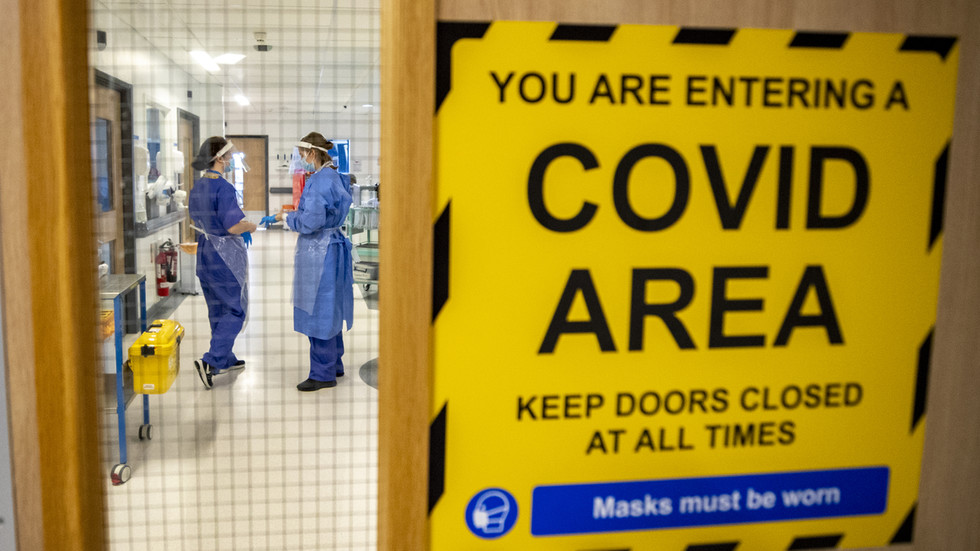A new study shows that 30 percent of Covid hospitalized patients are readmitted five months after discharge – and that one in eight dies.
The new article by UK university researchers and government statisticians sends a serious message that leaving the hospital may not be the end of things for Covid-19 patients. Observing patients discharged from the hospital during the first wave in England, almost a third ended up returning to the hospital and one in eight died.
The study followed 47,780 people who had been hospitalized in England with the virus and subsequently released, totaling 80 percent of those who had been hospitalized and survived the study period (until August 31, 2020).
Also at rt.com
As Lockdown 3.0 arrives in Britain, the time for reason and the discussion is over. Only dissent will save us now
The main results were that 29.4 percent of those discharged were readmitted to the hospital at a later date and 12.3 percent died. An obvious question is whether these were elderly people who were going to get sick and die for other reasons anyway. The study found that those who were hospitalized with Covid-19 were more likely to be 50 years old or more, were male, lived in underserved areas, were ex-smokers and were overweight or obese; they were also more likely to be comorbid than the general population, with a higher prevalence of previous hospitalization and all pre-existing conditions measured (mainly hypertension, cardiovascular problems, respiratory diseases and diabetes).
When patients were paired with similar people in the general population who never had the disease, these post-Covid patients were 3.5 times more likely to be admitted to the hospital and 7.7 times more likely to die.
Covid-19 is a particularly unpleasant disease, period, and is particularly deadly to people with underlying medical problems, as it activates the immune system to attack the patient’s own organs. The ‘cytokine storm’ phenomenon received a lot of attention at the beginning of the pandemic, when patients who appeared to be well suddenly went into a catastrophic crisis as their immune systems got out of hand.
In December, a Yale University study found that ‘autoantibodies‘were a big problem for Covid patients. As the Guardian reported: “The scientists compared the immune responses in patients and uninfected people and found dozens of aberrant antibodies in the former. These blocked antiviral defenses, eliminated useful immune cells and attacked the body on several fronts, from the brain, blood vessels and liver to connective tissue and the gastrointestinal tract.. “
The new research, led by Kamlesh Khunti, professor of diabetes and vascular medicine at the University of Leicester, found something that is perhaps surprising: while those who were most severely ill with Covid-19, those who needed intensive care, experienced higher rates of post-discharge, respiratory disease and diabetes, death rates, readmission and major adverse cardiovascular events (MACE) were worse in those who were not in intensive care. In other words, it was not simply a case of people with the worst initial illnesses and who had the worst long-term results.
Read More

Perhaps equally surprising, although it was people over 70 who were most likely to have problems after discharge, Covid Long appeared to have a greater impact on those under 70 compared to the normal risk of illness (the average age of women). people in the study was 65)
As this is an observational study, the old saying that ‘correlation is not equal to causality‘applies. For example, as the newspaper notes, people who were already experiencing problems like diabetes and heart disease may be more likely to end up in hospital than those who are in better health.
The research also did not look at those who were not sick enough with Covid-19 to be admitted to the hospital. Research published earlier this month suggests that 12.4 million people in England may have had Covid, of which 300,000 needed hospital treatment – about 2.5%. So, overall, we are probably looking at about 0.75 percent of the population that was readmitted thanks to Covid over. That said, there have also been reports of multiple organ problems among non-hospitalized people, so there is little room for complacency.
Another new study found that how quickly a patient’s immune system responds after infection with Covid plays a crucial role in determining the severity of the attack and may play a role in its recurrence.
Researchers at the University of Cambridge studied 207 people who tested positive for the virus over a period of three months and found that those without symptoms or mild cases created a robust immune response shortly after being infected. But those who needed hospitalization had an impaired immune response, leading to a delayed and weakened attempt to fight the virus.
The main message of these findings is that we urgently need to do more research on the full impact of post-Covid syndrome (PCS), both to improve treatment and to assess future impacts on health services.
One idea that would be worth investigating is whether the damage is caused during the period when people feel bad about Covid-19 or if it continues after they seem to have recovered. If it is the latter, treatment for suppressing these autoimmune effects may need to continue in some way for weeks or months later.
Read More

What is clear is that the so-called ‘Long Covid‘it’s more than just feeling bad for longer than you would expect. The impacts of the disease, especially on the way it leads the immune system to damage organ tissues, can be very serious and some patients never get over them. At the very least, we need a way to monitor patients with Covid-19 after they recover, so that we can be aware of these problems and plan the extra demands they can make on healthcare.
It can also make us reconsider exactly how many people died from Covid-19. If someone leaves the hospital only to die weeks or months later from organ damage caused by the disease, we should probably count Covid’s deaths as well. The headline measure at the moment is ‘deaths from any cause within 28 days of a positive test.’ This measure is probably ignoring some deaths that should be counted and possibly includes some deaths that were entirely from another cause. Death certificates are better, but they have their own problems. Getting a more accurate image can be tricky, but it is still important.
Some will undoubtedly use this role as additional ammunition to promote blockades. But while this may alter the balance between the benefits and the costs of restrictions, the fact remains that the costs of blockages are still not being sufficiently emphasized. The focus remains myopically on reducing the number of infections. But while some measures have a big impact at relatively low cost – like banning large indoor meetings or pestering us to avoid crowded spaces – some have small benefits and huge costs, like closing schools.
Above all, this new research emphasizes once again the need to continue vaccination programs as soon as possible. No stone should be left unturned for everyone to be vaccinated as soon as possible. So, we can leave this mess behind once and for all.
Do you think your friends would be interested? Share this story!
The statements, views and opinions expressed in this column are the sole responsibility of the author and do not necessarily represent those of RT.
